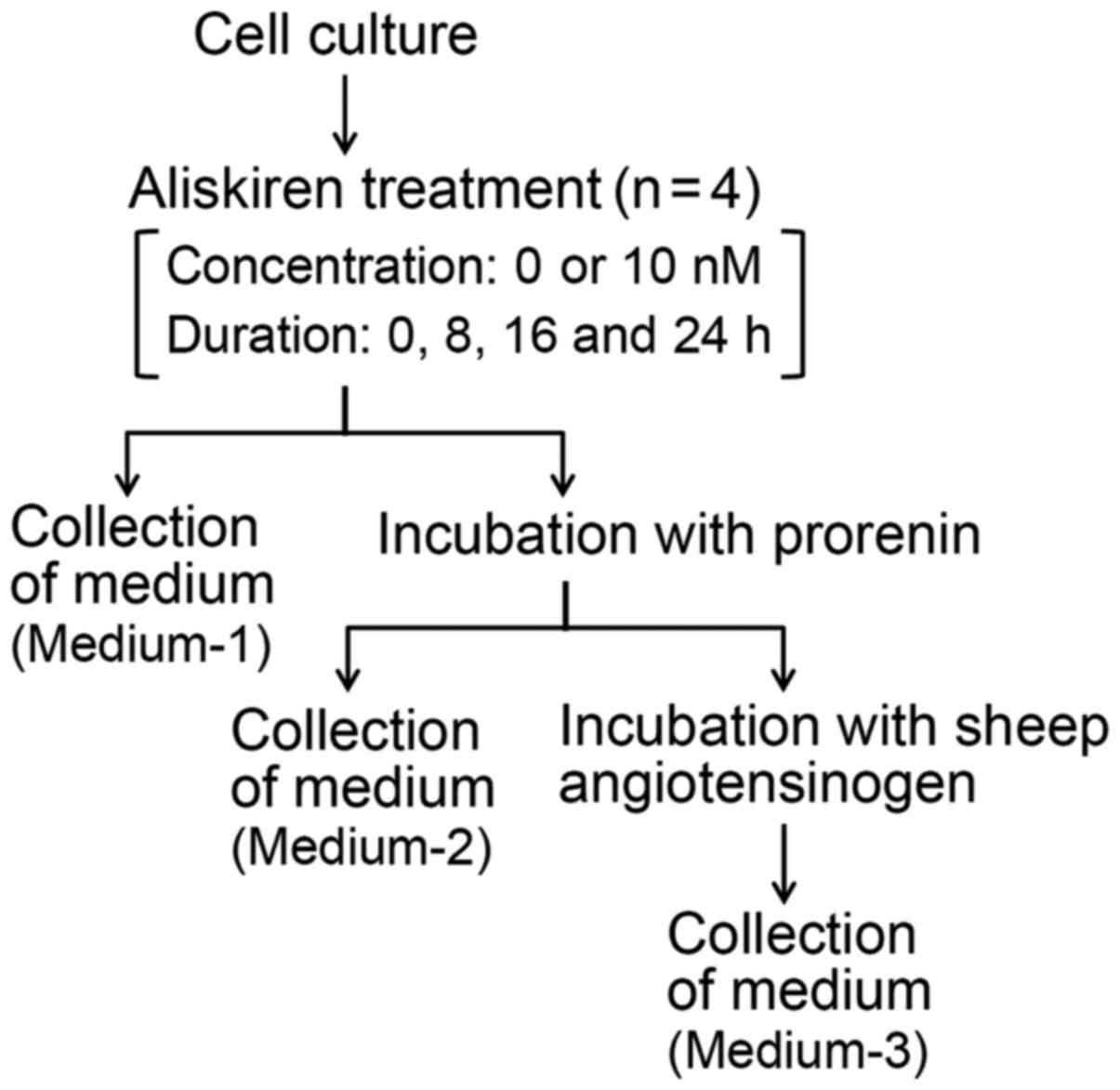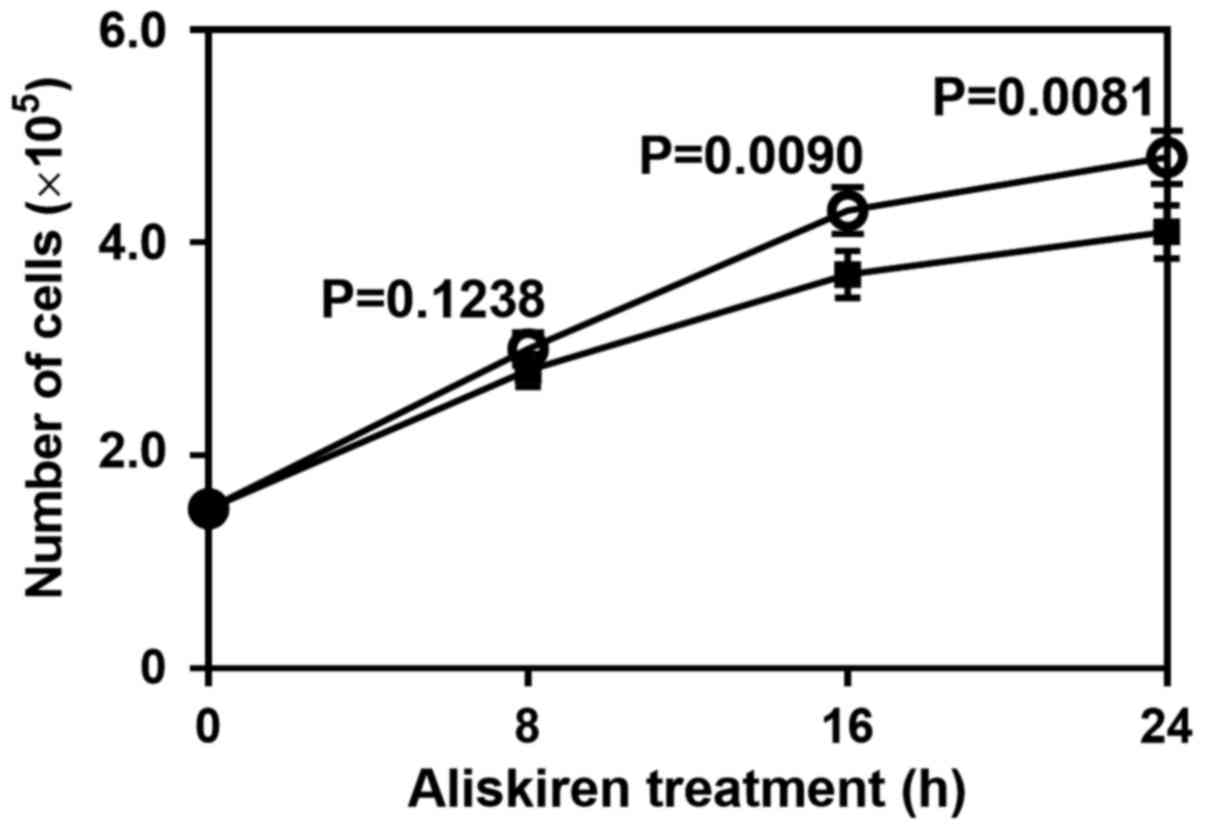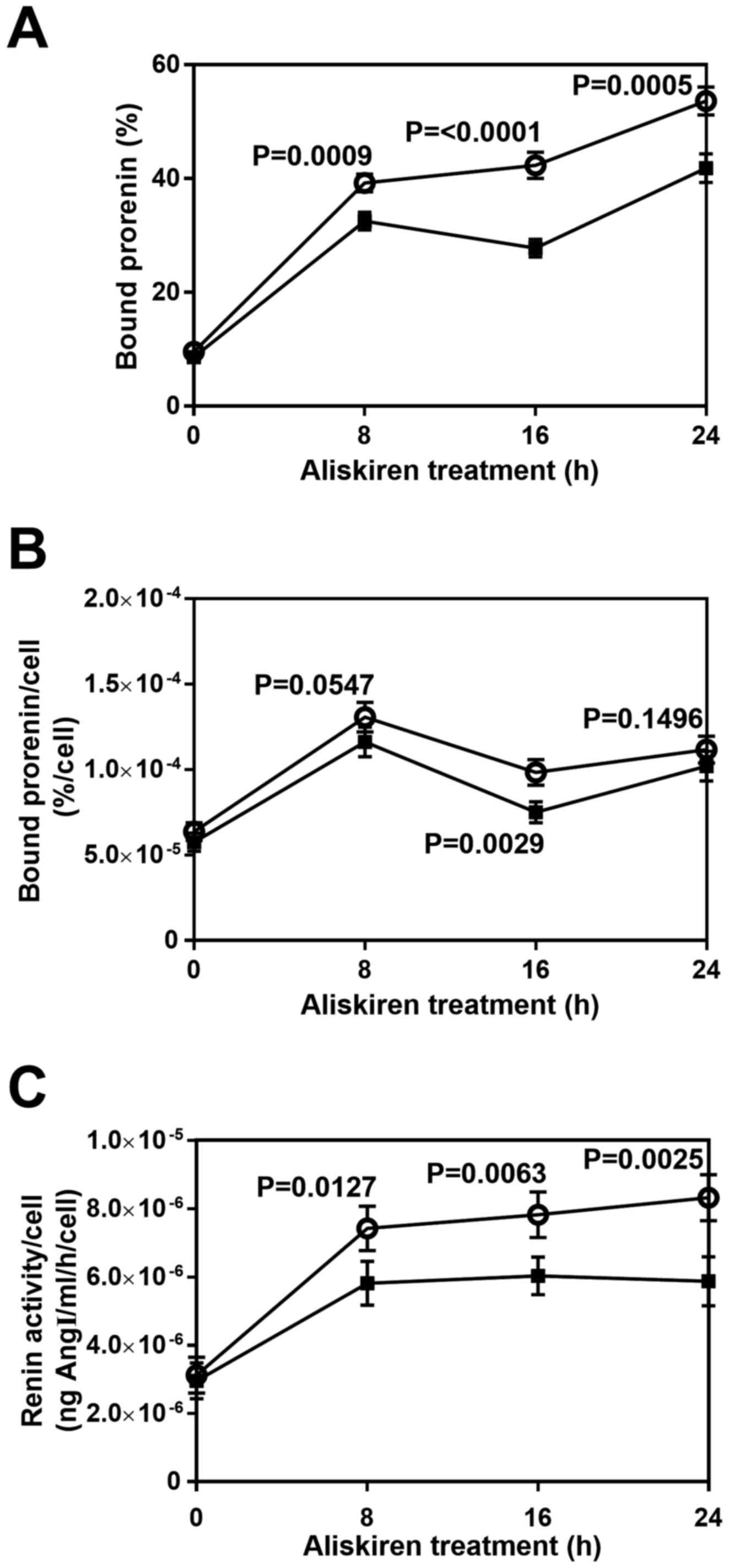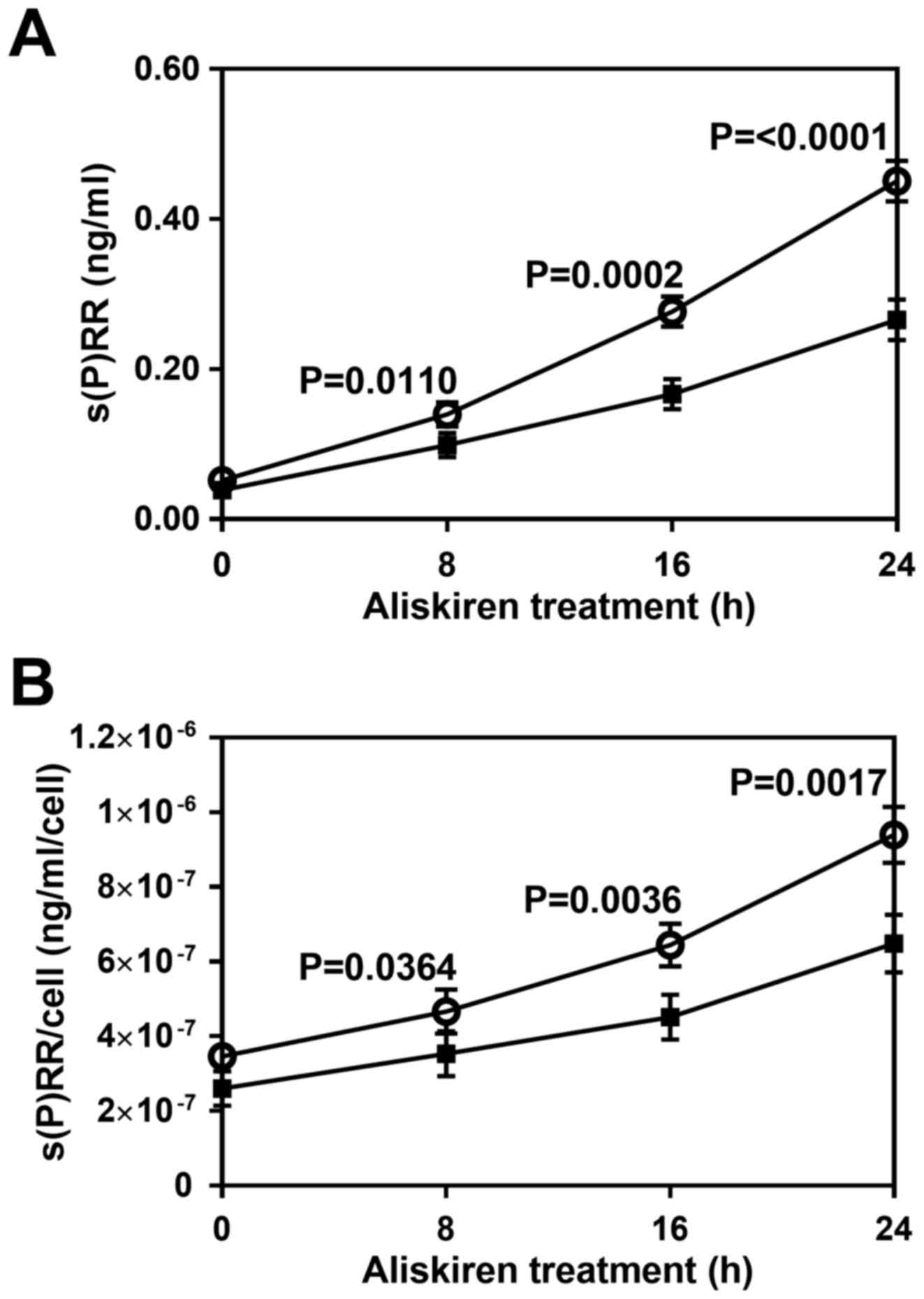|
1
|
Nguyen G, Delarue F, Burcklé C, Bouzhir L,
Giller T and Sraer JD: Pivotal role of the renin/prorenin receptor
in angiotensin II production and cellular responses to renin. J
Clin Invest. 109:1417–1427. 2002. View Article : Google Scholar : PubMed/NCBI
|
|
2
|
Krop M, Lu X, Danser AH and Meima ME: The
(pro)renin receptor. A decade of research: What have we learned?
Pflugers Arch. 465:87–97. 2013. View Article : Google Scholar : PubMed/NCBI
|
|
3
|
Nabi AHMN, Biswas KB, Ebihara A, Nakagawa
T and Suzuki F: Renin angiotensin system in the context of renin,
prorenin, and the (pro)renin receptor. Rev Agric Sci. 1:43–60.
2013.
|
|
4
|
Kinouchi K, Ichihara A, Sano M, Sun-Wada
GH, Wada Y, Kurauchi-Mito A, Bokuda K, Narita T, Oshima Y, Sakoda
M, et al: The (pro)renin receptor/ATP6AP2 is essential for vacuolar
H+-ATPase assembly in murine cardiomyocytes. Circ Res. 107:30–34.
2010. View Article : Google Scholar : PubMed/NCBI
|
|
5
|
Cruciat CM, Ohkawara B, Acebron SP,
Karaulanov E, Reinhard C, Ingelfinger D, Boutros M and Niehrs C:
Requirement of prorenin receptor and vacuolar H+-ATPase-mediated
acidification for Wnt signaling. Science. 327:459–463. 2010.
View Article : Google Scholar : PubMed/NCBI
|
|
6
|
Kanda A, Noda K, Saito W and Ishida S:
(Pro)renin receptor is associated with angiogenic activity in
proliferative diabetic retinopathy. Diabetologia. 55:3104–3113.
2012. View Article : Google Scholar : PubMed/NCBI
|
|
7
|
Matavelli LC, Huang J and Siragy HM:
(Pro)renin receptor contributes to diabetic nephropathy by
enhancing renal inflammation. Clin Exp Pharmacol Physiol.
37:277–282. 2010. View Article : Google Scholar : PubMed/NCBI
|
|
8
|
Contrepas A, Walker J, Koulakoff A, Franek
KJ, Qadri F, Giaume C, Corvol P, Schwartz CE and Nguyen G: A role
of the (pro)renin receptor in neuronal cell differentiation. Am J
Physiol Regul Integr Comp Physiol. 297:R250–R257. 2009. View Article : Google Scholar : PubMed/NCBI
|
|
9
|
Shibayama Y, Fujimori T, Nguyen G, Hirose
T, Totsune K, Ichihara A, Kitada K, Nakano D, Kobori H, Kohno M, et
al: (Pro)renin receptor is crucial for Wnt/β-catenin-dependent
genesis of pancreatic ductal adenocarcinoma. Sci Rep. 5:88542015.
View Article : Google Scholar : PubMed/NCBI
|
|
10
|
Ludwig J, Kerscher S, Brandt U, Pfeiffer
K, Getlawi F, Apps DK and Schägger H: Identification and
characterization of a novel 9.2-kDa membrane sector-associated
protein of vacuolar proton-ATPase from chromaffin granules. J Biol
Chem. 273:10939–10947. 1998. View Article : Google Scholar : PubMed/NCBI
|
|
11
|
Cousin C, Bracquart D, Contrepas A, Corvol
P, Muller L and Nguyen G: Soluble form of the (pro)renin receptor
generated by intracellular cleavage by furin is secreted in plasma.
Hypertension. 53:1077–1082. 2009. View Article : Google Scholar : PubMed/NCBI
|
|
12
|
Nakagawa T, Suzuki-Nakagawa C, Watanabe A,
Asami E, Matsumoto M, Nakano M, Ebihara A, Uddin MN and Suzuki F:
Site-1 protease is required for the generation of soluble
(pro)renin receptor. J Biochem. 161:369–379. 2017. View Article : Google Scholar : PubMed/NCBI
|
|
13
|
Gonzalez AA, Lara LS, Luffman C, Seth DM
and Prieto MC: Soluble form of the (pro)renin receptor is augmented
in the collecting duct and urine of chronic angiotensin
II-dependent hypertensive rats. Hypertension. 57:859–864. 2011.
View Article : Google Scholar : PubMed/NCBI
|
|
14
|
Morimoto S, Ando T, Niiyama M, Seki Y,
Yoshida N, Watanabe D, Kawakami-Mori F, Kobori H, Nishiyama A and
Ichihara A: Serum soluble (pro)renin receptor levels in patients
with essential hypertension. Hypertens Res. 37:642–648. 2014.
View Article : Google Scholar : PubMed/NCBI
|
|
15
|
Lu X, Wang F, Xu C, Soodvilai S, Peng K,
Su J, Zhao L, Yang KT, Feng Y, Zhou SF, et al: Soluble (pro)renin
receptor via β-catenin enhances urine concentration capability as a
target of liver X receptor. Proc Natl Acad Sci USA.
113:E1898–E1906. 2016. View Article : Google Scholar : PubMed/NCBI
|
|
16
|
Wood JM, Maibaum J, Rahuel J, Grütter MG,
Cohen NC, Rasetti V, Rüger H, Göschke R, Stutz S, Fuhrer W, et al:
Structure-based design of aliskiren, a novel orally effective renin
inhibitor. Biochem Biophys Res Commun. 308:698–705. 2003.
View Article : Google Scholar : PubMed/NCBI
|
|
17
|
Pantzaris ND, Karanikolas E, Tsiotsios K
and Velissaris D: Renin inhibition with aliskiren: A decade of
clinical experience. J Clin Med. 6:62017. View Article : Google Scholar
|
|
18
|
Feldman DL, Jin L, Xuan H, Contrepas A,
Zhou Y, Webb RL, Mueller DN, Feldt S, Cumin F, Maniara W, et al:
Effects of aliskiren on blood pressure, albuminuria, and (pro)renin
receptor expression in diabetic TG(mRen-2)27 rats. Hypertension.
52:130–136. 2008. View Article : Google Scholar : PubMed/NCBI
|
|
19
|
Ferri N, Greco CM, Maiocchi G and Corsini
A: Aliskiren reduces prorenin receptor expression and activity in
cultured human aortic smooth muscle cells. J Renin Angiotensin
Aldosterone Syst. 12:469–474. 2011. View Article : Google Scholar : PubMed/NCBI
|
|
20
|
Biswas KB, Nabi AN, Arai Y, Nakagawa T,
Ebihara A, Ichihara A, Inagami T and Suzuki F: Qualitative and
quantitative analyses of (pro)renin receptor in the medium of
cultured human umbilical vein endothelial cells. Hypertens Res.
34:735–739. 2011. View Article : Google Scholar : PubMed/NCBI
|
|
21
|
Nachman RL and Jaffe EA: Endothelial cell
culture: Beginnings of modern vascular biology. J Clin Invest.
114:1037–1040. 2004. View
Article : Google Scholar : PubMed/NCBI
|
|
22
|
Nasir UM, Takahashi K, Nagai T, Nakagawa
T, Suzuki F and Nakamura Y: Two peaks in pH dependence of
renin-angiotensinogen reaction. Biosci Biotechnol Biochem.
62:338–340. 1998. View Article : Google Scholar : PubMed/NCBI
|
|
23
|
Suzuki F, Hayakawa M, Nakagawa T, Nasir
UM, Ebihara A, Iwasawa A, Ishida Y, Nakamura Y and Murakami K:
Human prorenin has ‘gate and handle’ regions for its
non-proteolytic activation. J Biol Chem. 278:22217–22222. 2003.
View Article : Google Scholar : PubMed/NCBI
|
|
24
|
Danser AH and Deinum J: Renin, prorenin
and the putative (pro)renin receptor. Hypertension. 46:1069–1076.
2005. View Article : Google Scholar : PubMed/NCBI
|
|
25
|
Nagase M, Suzuki F, Sawai Y, Orihashi T,
Inui Y, Nakagawa T and Nakamura Y: Purification and some properties
of recombinant sheep angiotensinogen expressed in Chinese hamster
ovary cells. Biomed Research Tokyo. 18:439–443. 1997. View Article : Google Scholar
|
|
26
|
Ebihara A, Nasir UM, Yoshida S, Kondou T,
Nakagawa T, Fukamizu A, Suzuki F, Nakamura Y and Murakami K: Sialic
acid residue of ovine angiotensinogen does not affect the
reactivity to human renin. Biomed Research Tokyo. 21:105–109. 2000.
View Article : Google Scholar
|
|
27
|
Suzuki F, Yamashita S, Takahashi A, Ito M,
Miyazaki S, Nagata Y and Nakamura Y: Highly sensitive microplate
ELISA for angiotensin I using 3,3′5,5′tetramethylbenzidine. Clin
Exp Hypertens. A12:83–95. 1990.
|
|
28
|
Nabi AH, Biswas KB, Nakagawa T, Ichihara
A, Inagami T and Suzuki F: Prorenin has high affinity multiple
binding sites for (pro)renin receptor. Biochim Biophys Acta.
1794:1838–1847. 2009. View Article : Google Scholar : PubMed/NCBI
|
|
29
|
Ku HH: Notes Use Propag Error Formulas. J
Res Natl Bur Stand. 70C:263–273. 1966.
|
|
30
|
Nabi AH, Kageshima A, Uddin MN, Nakagawa
T, Park EY and Suzuki F: Binding properties of rat prorenin and
renin to the recombinant rat renin/prorenin receptor prepared by a
baculovirus expression system. Int J Mol Med. 18:483–488.
2006.PubMed/NCBI
|
|
31
|
Nurun NA, Uddin NM, Nakagawa T, Iwata H,
Ichihara A, Inagami T and Suzuki F: Role of ‘handle’ region of
prorenin prosegment in the non-proteolytic activation of prorenin
by binding to membrane anchored (pro)renin receptor. Front Biosci.
12:4810–4817. 2007. View
Article : Google Scholar : PubMed/NCBI
|


















